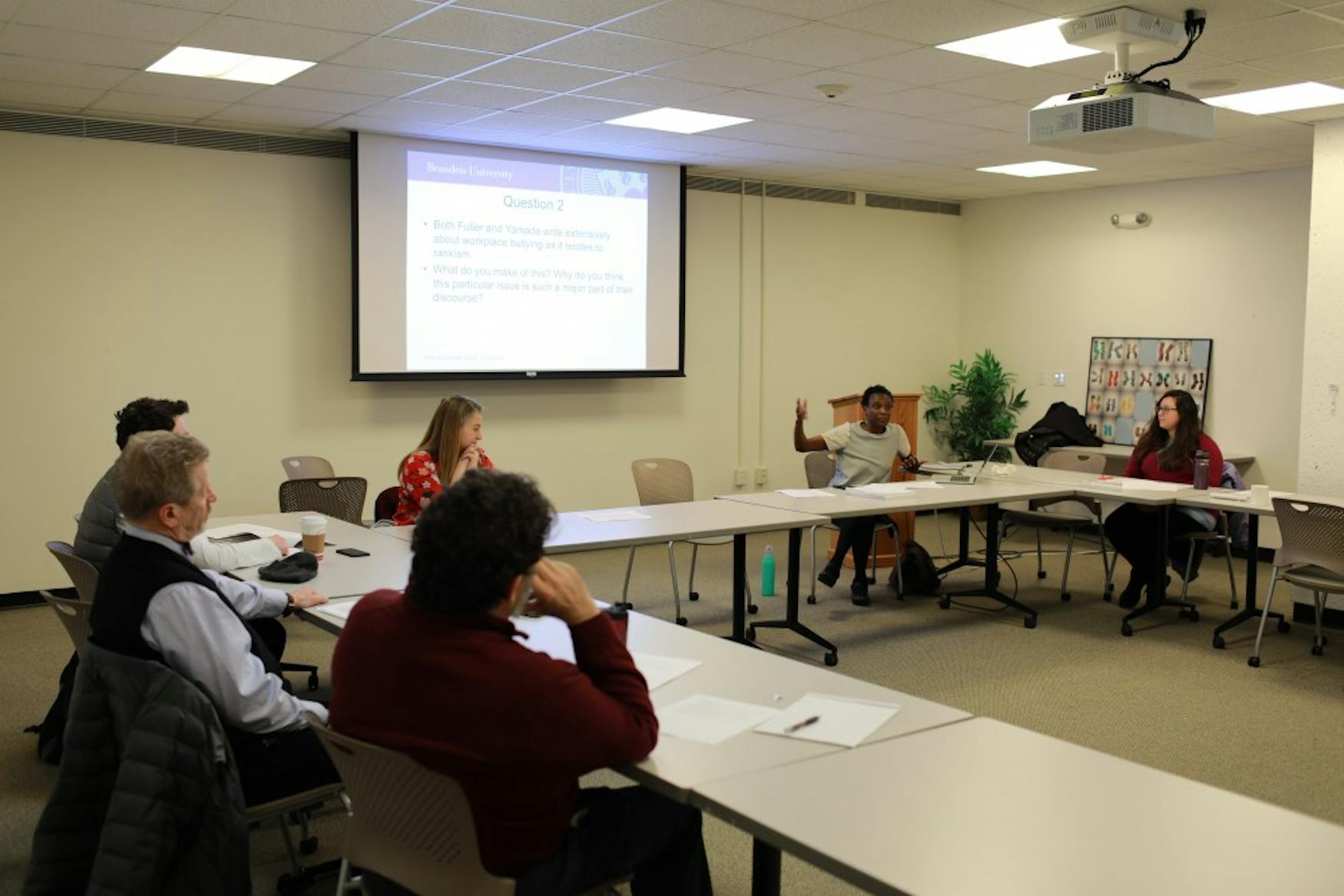“Rankism” in the Workplace
A panel of Brandeis faculty discuss the effects of rankism on campus
Before he became a “nobody,” Robert Fuller was an accomplished physicist, author and civil rights advocate who was the youngest college president in the United States. After a four-year stint as the president of Oberlin College, Fuller resigned, saying he believed his mission had been accomplished and that it was time to move on. Following his resignation, Fuller found that his status as a public figure had vanished and that his rise, and sudden fall from status was a phenomena as equally deserving of academic exploration as the cosmos. Curious and searching for answers, he embarked on a mission to form a social movement to “advance human dignity.”
One of the consequences of Fuller’s search for answers is his book, “All Rise: Somebodies, Nobodies, and the Politics of Dignity,” which was the focus of discussion at a faculty panel on diversity in the Gerstenzang Science Library on Thursday, March 15. Allyson Livingstone, the director of diversity, equity, inclusion, education, training and development on campus, led the discussion. She passed around an essay on Fuller’s book by David C. Yamad, a law school professor at Suffolk University, who studies bullying in the workplace. In the essay, Yamad criticizes Fuller’s belief that individuals, rather than laws will create workplaces that allow for worker dignity. Livingstone began the discussion by saying, “This is an invitation to reflect, look for learning, be curious and dialogue with empathy. We’re asking questions, we’re connecting and we’re also being conscious of the ways that we interact with one another. Some of these topics ... they don’t seem like they can evoke an emotional response. She explained that the purpose of the discussion was to “ask ourselves to be reminded to the ‘how’ of how we do this work.”
Faculty members spoke one by one, eventually forming a consensus that “rankism,” the abuses of power associated with rank, was a barrier to ascending the academic and administrative ladders at almost every U.S. institution. The panelists found that Brandeis is no different. Some faculty saw rankism as an insurmountable problem. Suzie Flug-Silva, a senior leader for the Eli J. and Phyllis N. Segal Citizen Leadership program at the Heller School for Social Policy and Management, expressed her concerns with rankism and Fuller’s book, saying, “I see the relationship and I see how assessing someone a certain way because of their race, because of their class, because of their sex is ranking people, but they feel qualitatively different, and it’s like you said. I don’t think solving rankism would necessarily take someone’s racism away.”
Following up on this point, Alyssa Stalsberg Canelli, the assistant director of experiential learning, pointed out that rankism may be the result of racism, sexism and other ‘isms.’ She said, “There’s an empathetic bridge that has to happen.” She wondered why denial of various “isms” persists in academia and blamed a lack of empathy for the problem, saying, “I just find it odd; it certainly doesn’t occur to me to deny the existence of gravity just simply because I don’t understand the science.”
Soon, the discussion turned toward how rankism affects those who win tenure at Brandeis. Canelli spoke again, saying, “I think that tenure creates, at least in terms of workplace environment, really ripe situations for bullying, and there’s no recourse at all in higher ed.” All the faculty members agreed that the roles in academia are so strongly entrenched that a hierarchical system is already in place that makes those faculty at the bottom feel undervalued. Shannon Keens, the academic administrator for the Women’s, Gender and Sexuality Studies Program, added that a lack of accountability fuels this system, noting, “People act out in a faculty meeting, or something like that, their boss isn’t going to say, like, you can’t do that, you do that again, then you’re getting written, you know, and that has been shocking to me.”
Despite the sentiment in the room that rankism is alive and well at Brandeis, a few faculty members saw ways for the University may mitigate its effects. Don Greenstein, an ombud for diversity, inclusion and equity, suggested that experiential learning is necessary. He said, “I know there are plenty of schools, as well as organizations, that take individuals and put them in the role of spending time with someone who has much less experience of what it’s like.” He believes that this method helps those in higher-up positions empathize and hear the concerns of faculty below them.
Toward the end of the conversation, Livingstone posited that rankism was even permeating the student body on campus. She expressed concerns that Brandeis students, bowing to peer pressure or feelings of inadequacy, were involving themselves in too many clubs and extracurricular activities simply for the sake of padding their resumes. She admitted that she does not blame students for this trend, saying, “Hey, if the school-based adults are doing it in the system, why wouldn’t the students, right?”
Turning again to the text, the panel examined a passage from Fuller’s book that reads, “But violence is rarely, if ever, senseless. If it seems so, we’ve simply failed to understand it. Like the original n-word, nobody uses an epithet that packs a powerful punch. That is why we’re so desperate to pass as somebodies and shield ourselves from rankism’s punishing sting.” As the panelists began to drift out of the room, Livingstone smiled and posed a question to those remaining: “Y’all are here in part because you want to know more about all kinds of things related to privilege and oppression. Can we think about some of this stuff? What do we do? How do we work with folk who just aren’t there yet? How do we support?” She suggested that while the answers to the problem of rankism are elusive, the conversation must continue.



Please note All comments are eligible for publication in The Justice.